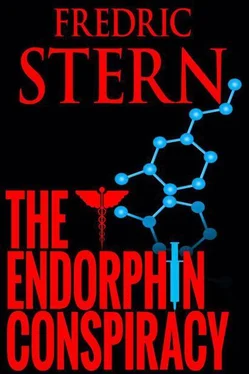“It’s Howard Kapinsky, sir. I’m not sure how it’s going to work out. We’ve had trouble working together in the past, and my year off doesn’t seem to have changed anything. Now I’m his boss, and I’m sure that bothers him even more.”
Pederson chuckled. “I wouldn’t lose any sleep over the situation, though I must admit you’re going to have your hands full reigning in Howard Kapinsky over the next year. He’s a smart boy, but he’s different.”
Different? Geoff couldn’t understand why Pederson had let the fool into the residency, nor why he didn’t have the guts to let him go. “That’s for sure. I’ll do my best to keep him out of trouble.”
“If anyone can do it, you can. Kapinsky respects you a great deal.”
Geoff did his best to contain his incredulity, but knew his facial expression betrayed him. “Your confidence is appreciated.” Pederson failed to detect his reaction. Something else was occupying his thoughts.
“Enough on that subject,” Pederson said. He gazed through his large window into the distance, his weighty hands in the pockets of his heavily starched white coat. “There is another, more important, matter you need to be made aware of—your first official duty as Chief Resident.”
Pederson returned to his desk chair, sat down, and removed his reading glasses. His voice dropped, barely a whisper, forcing Geoff to strain forward. “Next Monday we will be hosting an international delegation of scientists from PETronics Corporation’s headquarters in Copenhagen lead by Dr. Yuri Zelenkov. Dr. Zelenkov and his party will be spending the week here as our guests, learning firsthand the intricacies of our PET scanning program and observing in the operating room.”
“Do you know Dr. Zelenkov personally?”
“Yes, quite well, but I’d like him to get to know you, and you, him. I think you’ll find it a rather rewarding experience. There might even be a free trip to PETronics Headquarters in Copenhagen if you play your cards right.”
Geoff was perplexed. He hadn’t ever heard of Zelenkov before.
“Next to Balassi and his technician,” Pederson continued, “you know as much or more about the clinical applications of PET scanning than anyone else in this medical center. I want you to share freely whatever knowledge you have with Dr. Zelenkov and his group. By the time he leaves, he needs to feel completely comfortable with our program, particularly its applications in the diagnosis and surgical treatment of seizures. That’s his area of special interest.”
Pederson paused, as if sensing Geoff’s hesitance. He leaned forward in his chair, his voice rising just enough for Geoff to hear without straining. “Geoff, I know you feel your clinical duties are far more important, that you might view this as simply an administrative pain in the rear, but this is a potentially monumental visit for our Medical Center. I needn’t remind you of the important role PETronics has played at the NYTC. If it weren’t for their generosity, we wouldn’t be here.”
“Yes, sir,” Geoff replied. Pederson never offered choices.
“Good,” Pederson said. He stood abruptly, a broad, deep grin on his face. He patted Geoff’s still-sore shoulder. “Then get back to work. Keep your nose to the grindstone this year, and your future will be golden.”
Geoff completed evening rounds in the NSICU with great swiftness, delegating most of the basic patient management work to Karen Choy and Brian Phelps, who in turn delegated the scut work to their assigned medical students.
Happily, Kapinsky was out of the way, working up a patient in the ER, his assigned med student in tow. Geoff sat in the staff workroom of the NSICU, staring at the patients’ lab values on the computer screen. He removed the three by five cards he kept on each patient from the breast pocket of his white coat and studied them one last time, checking to see if he had missed anything. He hadn’t. He glanced at his watch. Six-thirty.
The e-mail message still gnawed at him. He knew it was probably just a crank or misdirected, but it bugged him. When he had time, he’d try and track down the sender. If he couldn’t figure it out, he was sure his brother Stefan could. Geoff had promised Stefan he’d come over for dinner.
“Geoff, I think we’re okay here if you want to go home,” Karen Choy said. “I’m on call tonight anyway. My hot date is right here in the ICU.”
“Sure you’re okay?”
“Everything’s under control. Smithers ‘and little Jessica’s vitals have stabilized. Their brain stems are on autopilot. DeFranco’s coming out of his phenobarbital coma and the nurses are getting ready to ship him off to the ward. There’s nothing for me to do but babysit tonight.”
“Guess you’re right,” Geoff replied. He stood up and walked to the door. “If you run into any problems—”
“I have your cell phone number. Just don’t turn it off,” Karen replied. She smiled.
“Thanks, Karen.” Geoff turned to leave, then paused. “Good job today. See you in the morning.” Geoff grabbed his backpack and headed for the elevator. He left the hospital through the main entrance, avoiding the ER. It was never wise to leave through the ER when your goal was to get home. After this morning’s eventful sprint to the Trauma Center, he decided to take the subway instead of walk the fifteen blocks as he usually did.
The sultry, summer night smacked him in the face like a wave of steaming, stagnant water as he left the controlled environment of the medical center and descended the marble steps onto Broadway. New York in the summer was New York at its worst. People, from local shopkeepers and apartment supers to gangs of teenagers, escaped the sweltering confines of their homes, apartments, and stores and simply hung out—on the stoops of their buildings, out their windows and doors, on street corners. People hanging out meant more boozing on the sidewalks, more noise, and when the thermometer rose high enough and tempers flared, more crime. The worst of New York magnified by a factor of ten.
Geoff entered the 168th Street subway station doing his best to avoid the scraggly panhandler who stood by the entrance to the station. The fetid smell of rotting refuse nearly overwhelmed Geoff. He descended the stairs, passing beneath an overhang splattered with posters, and whisked down the long, dimly lit corridor that lead to the IRT elevator.
The subway, New York’s netherworld. Eight hundred miles of tracks spanned five boroughs, served twelve million people. A city within a city with its own unique sub-culture and population. Street people, like the tattered panhandler, lived in the subways all year round. For a buck, the subway delivered you from one end of Manhattan to the other, or if you were in the wrong place at the wrong time, swallowed you up like an insect in a Venus fly trap.
The faint but distinctive and pungent aroma of marijuana hung like a cloud in the air about mid-corridor, then it was overpowered by an acrid mixture of cheap whiskey and vomitus. Geoff’s nostrils flared at the assault on his senses. The floor was littered with evidence of last night’s events: an empty bottle of Thunderbird wrapped in a well-worn brown paper bag lay on the floor by the elevator door, next to it a used condom, a crumpled Penthouse centerfold, a half-eaten bag of Cheetos.
Geoff scanned the area. No one lingered behind the riveted steel columns or in the dark, shadowed corners of the corridor—at least no one he could see. His hand reached up to press the IRT elevator button, then he paused.
A crunching sound. Movement off to his right. Geoff’s adrenalin surged, and he spun in the direction of the sound, reached down for his knife. He knew he was as prepared as possible for whatever was coming his way. He was as skilled in hand-to-hand combat as anyone around.
Читать дальше












